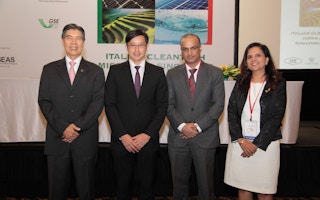The Sustainable Energy Association of Singapore (SEAS) and Asian Development Bank (ADB) on Thursday, 19 March, launched a new S$1 million programme that will train the region’s top officials on policy, technology, and project financing matters in the sustainable energy sector.
SEAS will manage the ADB-funded Centre of Excellence for Renewable Energy, the first of its kind for Singapore and the region. The centre will conduct seminars, workshops and sharing sessions for up to 150 policymakers a year from ADB’s 46 member countries.
The trainees will be selected by ADB, and the courses will be run by clean energy experts from Singapore and abroad.
There is no dedicated building for the centre, and training sessions could be held at locations such as the SEAS premises, government agency offices, or external meeting rooms in hotels.
Singapore’s Minister of State for Trade and Industry, Teo Ser Luck, launched the initative at Cleantech Forum, organised by the Italian Trade Commission and SEAS at the Grand Copthorne Waterfront Hotel.
“We strongly welcome collaboration between the Centre and industry players,” Teo said. The centre will help the region’s decision makers develop sustainable energy projects in the future, he added.
Edwin Khew, chairman of SEAS, said that Singapore’s expertise on clean energy issues could be useful for government officials in the region who may not be as well versed on how to effectively grow the sector in their countries.
ADB and SEAS both want to help build technical capacity and “develop markets for the private sector to develop viable and bankable renewable energy and energy efficiency projects” in Asia, he said.
SEAS’s strong linkages with project developers, financial institutions and key government agencies in Singapore and the region would help the centre fulfil this vision, he added.
“
Singapore was an obvious choice for the Centre because of its strong focus on research and development, government support, and good examples (of clean energy projects).
Jiwan Acharya, senior climate change specialist, Asian Development Bank
Business opportunities for clean energy in Asia are to the tune of US$2.5 trillion, said Khew. At the same time, more than 600 million people in the region lack access to energy for lighting and about 1.3 billion people still live without clean cooking energy.
The region is also set to meet most of this rapidly growing energy demand using fossil fuels, which will complicate efforts to contain global greenhouse gas emissions within safe limits defined by scientists.
Jiwan Acharya, senior climate change specialist, ADB, noted that this over-reliance on fossil fuels was a key challenge for the region. Addressing the problem would require increasing financing and building capacity among policymakers to develop and implement clean energy projects.
“Financial institutions sometimes have money to invest, but say that there are no bankable projects,” explained Acharya.
The centre will equip policymakers with the skills to translate their ideas to feasible and financially sound project ideas, and expose them to best practices and successful solutions from Singapore and the region, he noted.
This in turn would help countries secure much-needed funding from banks and other investors, said Khew.
The centre will also cement Singapore’s position as a global hub for clean energy and create market opportunities for sustainable projects in the region, he added.
Acharya agreed, noting that “Singapore was an obvious choice for the centre because of its strong focus on research and development, government support, and good examples (of clean energy projects)”.
Khew shared that the first training session will be conducted in April or May, and subsequent sessions will be conducted on a monthly or bi-monthly basis, depending on ADB’s selection of trainees. The agreement between ADB and SEAS is initially for a two-year period, with the possibility of extending the programme after that.
“Hopefully by the end of the two years, most countries will be on the same page” in terms of renewable energy capabilities, Khew said.
Participants would be expected to take the knowledge gained back to their countries and implement it, said Acharya. For example, if an official attended a course on how to draw up an energy efficiency roadmap, they would ideally draft and implement an action plan for their own countries soon after.
While government officials would not be expected to pay for these courses, SEAS said that it was exploring the possibility of private sector participation to make the programme sustainable in the long run.
Edited by Jessica Cheam and Stanley Tang

















